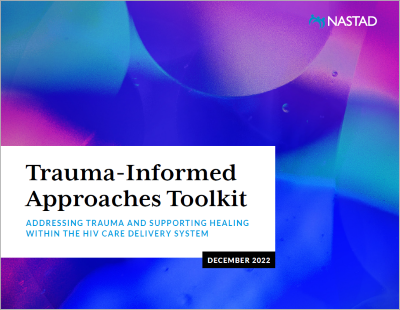Trauma-informed approaches (TIA) centers a person’s experiences and wellness. The use of TIA acknowledges the impact of trauma on people’s health and well-being and prevents re-traumatization. Applying a trauma-informed lens is a critical tool to address the HIV epidemic in the United States, as people with HIV have significant trauma histories when compared to the general population.
The application of TIA has rapidly evolved in health care and social service settings, including in the following ways:
- Scientists have increased our understanding of the neurological effects of trauma and our ability to recover and repair, leading to a greater focus on healing from trauma.
- TIA requires an understanding of trauma that goes beyond the impact it has on the lives of clients and staff to the root causes of that trauma. As a component of this, trauma-informed approaches have become more responsive to the impacts of racial trauma and are incorporating anti-racist frameworks.
- The COVID-19 pandemic accentuated the stress and impact on caregivers in our workforce, especially those who directly responded to the pandemic. There is recognition that building a more resilient and healing-centered system of care will address the underlying factors contributing to the challenges compounded by the pandemic.
Given the impact of trauma and stress on people with HIV, ending the HIV epidemic in the U.S. requires a trauma-informed and healing-centered system of care, a system that goes above and beyond achieving viral suppression. To support the Ryan White HIV/AIDS Program (RWHAP) community in achieving this, NASTAD has invested in the following resources:
- In 2017, NASTAD published a policy brief, A Health Systems Approach to Trauma-informed Care.
- In 2018, NASTAD released a TIA Toolkit to assist health departments, specifically RWHAP Part B and AIDS Drug Assistance Programs (ADAPs), AIDS services organizations (ASOs), and HIV clinics to take action on the recommendations outlined in the initial policy brief and toolkit. NASTAD has also provided TIA training and technical assistance to Part B Programs and ADAPs, as well as, harm reduction programs, ASOs, and HIV clinics over the past three years.
- In 2022, NASTAD updated the TIA Toolkit to emphasize resilience and healing for both people with HIV and the workforce. More recently published research, and interviews and focus groups with a newly established TIA Toolkit Advisory Panel (TAP) comprised of lived experts, technical experts on TIA and RWHAP Part B and ADAP staff, informed the development of the updated toolkit. The updated toolkit highlights the connections between resilience and healing, trauma and racism, and racial equity. The revisions build off our current understanding of trauma and broaden recommended approaches to encourage those that allow for greater safety and connection between clients and providers, a celebration of resilience displayed by individuals, and more effective and satisfying experiences of care for all involved.
This toolkit is intended for all RWHAP administrators and providers who deliver and fund services for people with HIV. It is meant to provide foundational information, language, and an introduction to tools and assessments for agencies and providers, both those who provide direct services funded through Parts A, B, C and D, as well as those in more administrative positions in Parts A and B. Creation of a trauma-informed and healing-centered system requires involvement of all stakeholders, from funders to direct services staff.
The toolkit is not meant to replace comprehensive and ongoing training about these topics, nor expected to bring about full organizational change without support (e.g., external consultants) or dedicated staff. Becoming a healing-centered organization requires much more than a one-day training— it requires a cultural shift and a nurtured and sustained commitment to well-being.
The PDF version of the TIA Toolkit contains all elements of this microsite, including the NASTAD-developed tools and assessments.
Trauma-Informed Approaches Toolkit (PDF)
Conjunto de herramientas de enfoques basados en el trauma (PDF)
Acknowledgments
This toolkit compiles research, policy briefs, best practices, and interviews with RWHAP providers, clients, and other subject matter experts in TIA, healing, and RWHAP services. NASTAD is especially grateful for the contributions of the TIA Toolkit Advisory Panel. The following people informed the development of the updated toolkit:
- Kahlib Barton
- Nathaniel Currie, DSW, MSW, LCSW
- Katy Davis, PhD, LCSW, Women’s HIV Program, University of California, San Francisco
- Mandy Davis, PhD, LCSW, Trauma Informed Oregon, Portland State University
- Morgan Farrington, GoodWorks: North AL Harm Reduction
- Holly Hanson, MA, Iowa Department of Public Health
- Dana Hines, PhD, RN, HIV/AIDS Bureau, Health Resources and Services Administration
- Vanessa Johnson, JD, Ribbon
- Edward Machtinger, MD, Center to Advance Trauma-Informed Health Care, University of California, San Francisco
- Jessika N. McGhee, CPSS-S, CPSS-R
- Jordan Minick, MPH, Wisconsin Division of Public Health
- Tatyana Moaton, PhD, MBA-HRM, San Francisco Community Health Center – Chicago Office
- Dimitri Joseph Moïse
- Krystal Sterling, Washington State Department of Health
- Nahid Suleiman, PhD, New Jersey Department of Health
- Ashley Yocum, Virginia Department of Health

